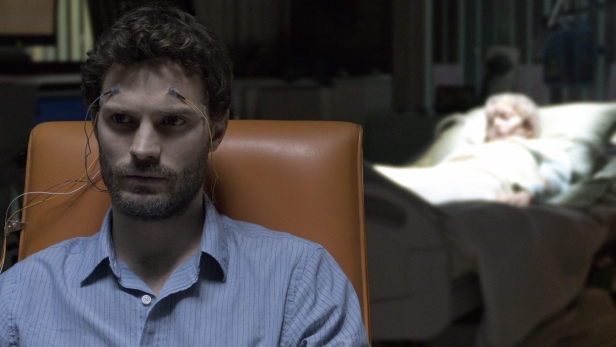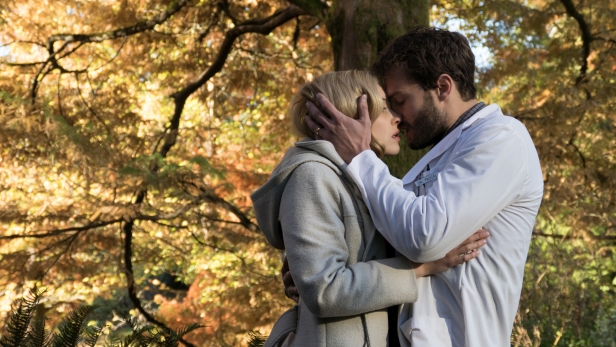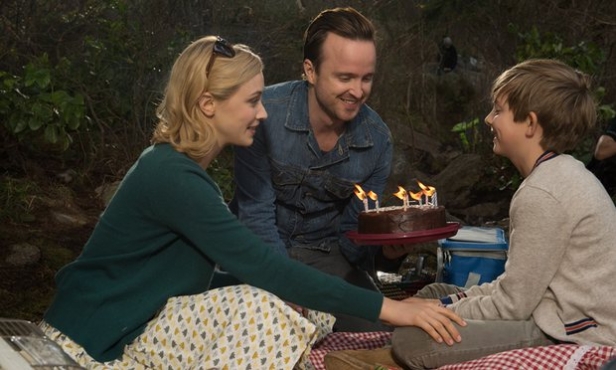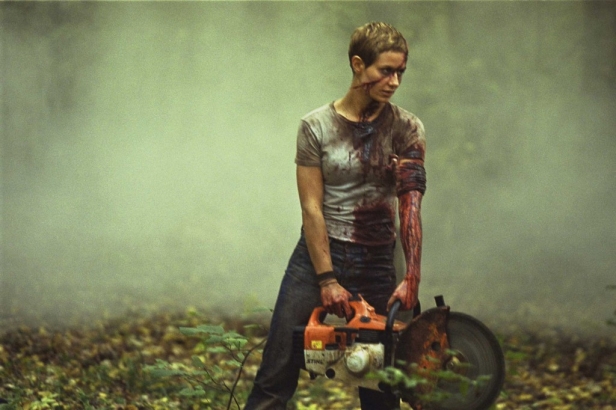Since he burst onto the genre scene in 2003 with blood-soaked and berserk High Tension (or Switchblade Romance, if we must), Alexandre Aja has been one of modern horror’s most interesting and prolific filmmakers. He’s dabbled in various areas of the genre, from the savage brutality of The Hills Have Eyes and the trashy fun of Piranha 3D to the beautifully shot, dark fairytale romance of Horns.
His new film, The 9th Life Of Louis Drax, sees him continue to push into the realm of magical realism, but with a Hitchcockian twist. Based on Liz Jensen’s novel, it tells the story of the titular young boy who is pulled out of the sea in a comatose state. Brilliant Dr Allan Pascal (50 Shades Of Grey‘s Jamie Dornan) attempts to bring Louis back to the waking world, while falling for his beautiful, fragile mother (11/22/63‘s Sarah Gadon). But is Louis’ father (Aaron Paul, Breaking Bad) really the one responsible for this? As Allan investigates, Louis tells his side story from inside the world of his imagination.
We were very excited to talk to Aja about his love of Hitchcock and Brian De Palma, why variety is key, and how he feels now looking back on the days of the Splat Pack.
How did you come to be involved with this film?
I was doing Horns and during the shoot I was becoming great friends with Max Minghella [who played Lee Torneau in the film]. He told me about this project that his father [the late Anthony Minghella] was supposed to direct before he died and he told me the story, and it was very intriguing. And he told me that he was trying to write the script based on the book, so he gave me a draft, and so my first relation was with the script, not the book.
Then I read the book and it was one of the most moving and intriguing and immersive stories I’ve read for a long time. The story is a double investigation; one is the doctor that’s trying to save Louis Drax and bring him back from his coma, and the other one is the investigation inside the mind of the child and trying to figure out what happened and why he fell off a cliff in San Francisco.
So the script was really had that very unique Hitchcockian quality, and it also had these emotional moments that were really unexpected in that kind of thriller. So it was really an interesting project for me.
It definitely has a Hitchcockian feel, with San Franscisco, the murder mystery and the blonde femme fatale!
Completely. You know, it’s a weird thing, one of the influential directors that had the most effect on me was Hitchcock, but beyond Hitchcock was De Palma, De Palma digesting Hitchcock. Dressed To Kill, Blow Out, these movies are very important to me, and when I was reading The 9th Life Of Louis Drax I was thinking about the opportunity of bringing this Vertigo vibe but also the opportunity of bringing post-Hitchcock Brian De Palma into the movie, it was really exciting.
Both this and Horns have this really beautiful, lush visual sensibility. Has it been a conscious choice to really push yourself visually?
That’s what really more and more attracts me to stories. The opportunity within stories to find a way to express a way of seeing things. More and more I’m attracted to scripts that I feel have that auteur dimension. I’m seeing a lot of scripts and a lot of them are really good, but you feel like any good director could make the same movie.
That’s not really what attracts me know to making them, I’m really responding to stories that give me the opportunity of making something that I hope is unique and something that, if another director were doing the movie, they would make a completely different movie.
It’s also a departure for you in terms of tone and genre, and the same was true of Horns. Has this been deliberate, or is it just that these are the stories that have grabbed your attention?
It’s really a conscious choice. The only thing I can see looking backward is I don’t want to do the same thing. After High Tension, I wanted to do something different and The Hills Have Eyes gave me that opportunity. But then after I didn’t want to do the same thing again. Mirrors was a full departure from the world of The Hills Have Eyes, and the same with Piranha, a gory comedy as opposed to something more scary, and when I was finishing Piranha I read Horns and I completely fell in love with the book because as a reader and as a viewer it was a story that I really wanted to make, it was something different.
I don’t want to do the same movie again and again so every time I’m trying to find something different. I cannot predict what people want to see, the only thing I can do is think about whether I would love to see it as a moviegoer and that’s how I choose projects. When I read Horns I had the feeling that something was so personal to me, echoing a lot of things I had in my head and my world and my previous movies, and genre bending and all that stuff, I had to make the movie. It was the same when I read Max’s script and then Liz Jensen’s book, I knew that I had to do something that was also very very different from Horns and that was Louis Drax.
The cast for this is fantastic, in addition to the three leads there’s Molly Parker, Oliver Platt, Barbara Hershey…did you have people in mind when you read the script?
When you read a book or script, you always picture people that are not necessarily actors. It’s like a dream; it’s new people, old people at the same time. But I wanted to work with Aaron Paul for a very, very long time, we were talking about different projects before and so he was an obvious choice. With Jamie, I saw The Fall and I thought he was a really interesting choice.
Sarah is maybe one of the strongest…It’s hard to talk about her without revealing too much but she is a fantastic Hitchcockian actress. She fantastic, period, but she’s multifaceted. She can really play the manipulation but also the break, when someone is really on the edge. She is really fantastic, she has had many great parts in many great movies in the past but I think Louis Drax is something that will really feature a new aspect of her personality.
How does the process of adapting a novel compare to working on a remake?
I think at the end, even if it doesn’t seem to be, there is a deep respect and a lot of humility when I adapt a pre-existing movie like The Hills Have Eyes or Maniac, or Piranha. I really go back to my feeling as a viewer, a reader, an audience member, and I want to discover and respect that feeling that I had when I discovered the original material for the first time. But also the honesty of what I felt, what could be improved, when I wanted more or less, and so yes, in a very strange way, working on a remake of a movie is very similar to working on an adaptation of a book in many aspects.
You have the same type of relationship to the foundation of the project in your mind and that’s always a great thing, because when you work on a movie it could take years. Years of fighting and resisting and struggling with so many people, the economics, the specifics, and everything. And to have this privilege of being able to go back to that first initial feeling that you had when you really fell in love with the story, whether it’s remake or a book, that’s the most important thing. That gives you the strength to keep fighting and keep working on the movie that you really want to deliver to the audience.
Finally, it’s been more than 10 years since High Tension and the Splat Pack era. How does it feel looking back on those movies now?
It was a very interesting time because I was absolutely not aware of what we were a part of. We were just coming from a very frustrating decade and a half of bad and really disappointing horror, and we were obsessed with these very strong and very scary horror movies from the 70s and the 80s. And so we made High Tension as an homage and tribute to all that cinema.
But at the same time, in different places around the world, people were doing exactly the same thing. The Descent, Dawn of The Dead, Cabin Fever, everyone was taking the same approach of going back to something that’s visceral and real, and really scary. And somehow we were also in sync with the audience that was craving that real type of horror movie.
The decade that followed was amazing, and I’m still amazed today that horror movies are huge openers. I went to see The Conjuring 2 in a theatre and to see that electric atmosphere, to see people being so excited and so ready to jump and scream, it’s a very effective type of cinema and I’m really happy that we were all part of that new wave 10 years ago and I’m happy that it’s kept going.
The 9th Life Of Louis Drax is in cinemas now. Read our review here and keep up with the latest genre news with the new issue of SciFiNow.



